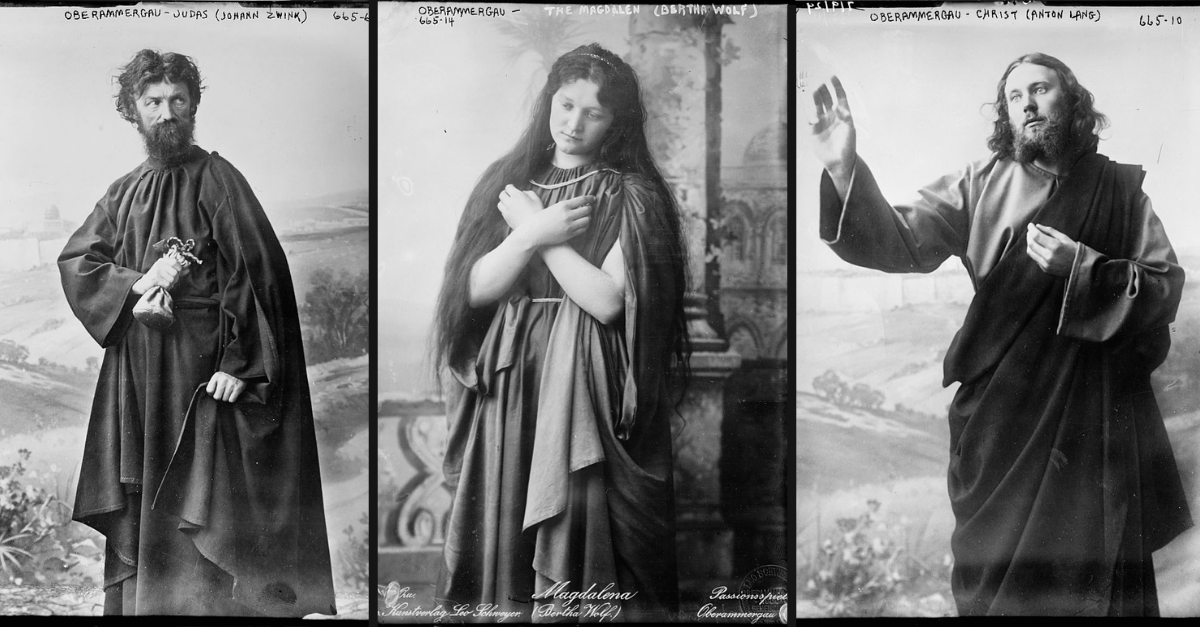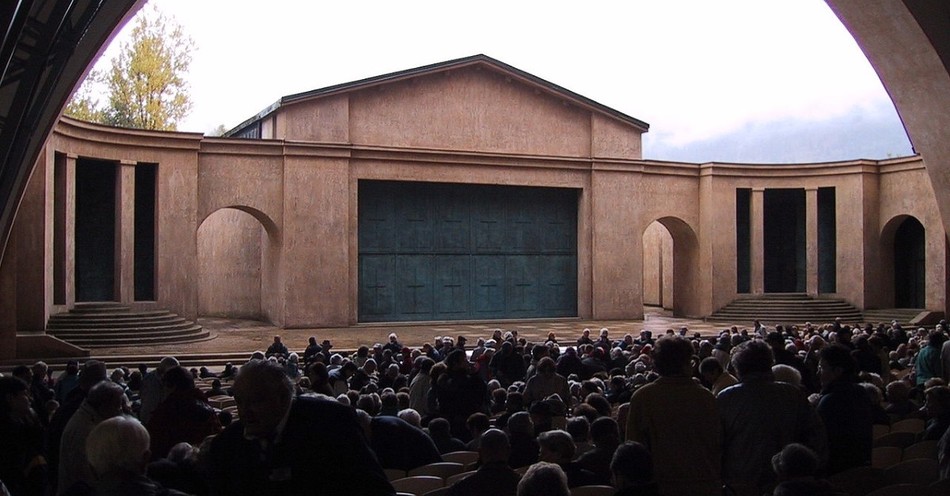In 1633 the villagers of Oberammergau, Germany, made a vow to God. During their lifetime, they fulfilled the sacred promise and passed it down from generation to generation. Today, nearly 400 years later, Christians worldwide travel to the quaint Bavarian village to witness the continued fulfillment of that vow, displayed through the Oberammergau Passion Play.
When and Why Did the Oberammergau Passion Play Start?
Oberammergau is nestled in a serene valley at the foothills of the Alps, but the little village was far from peaceful in 1633. Most of Europe was still actively involved in the brutal Thirty Years’ War (1618-48), which would ultimately decrease Germany’s population by 20 percent. Add to that the deaths caused by rampant famine and disease, and fatalities rose to as much as 60 percent.
Oberammergau was not immune when the bubonic plague resurged in Germany during the war and killed millions. Half the small village perished after contracting the disease, which came to be known as the Black Death. In desperation, the surviving residents stood before a cross. They vowed that if God delivered them from the plague, they would honor Him by performing a special reenactment of Christ’s suffering, death, and resurrection every tenth year.
After the vow was made, historical records show not one death occurred due to the bubonic plague in Oberammergau ever again—even though the disease continued to claim the lives of many in surrounding areas.
Overjoyed by God’s gracious intervention, the villagers of Oberammergau performed their first passion play in 1634 on a stage built atop the St. Peter and Paul Church cemetery, where so many of their loved ones were laid to rest. The play became a beacon of hope for the wartorn region. For over 300 years, it has continued to draw an audience and impact the hearts of millions.

Three Reasons Why the Oberammergau Passion Play is so Unique?
The Oberammergau Passion Play is unlike you’ve ever seen for three reasons:
1. The whole community comes together to make the production a success. The people of Oberammergau consider it their privilege and birthright to be a part of this passion play. Only those born in the village, or those who have lived there for twenty years, can participate. No exceptions are made. Once every ten years, everyone (from babies to senior citizens) has a role in making the event a success.
Besides the 2,000-plus cast (which includes directors, actors, the orchestral team, and choral members), some townspeople act as stage technicians, make costumes, and build sets. Others help by preparing the town’s hotels, restaurants, and shops for an onslaught of about half a million visitors attending the play.
Two years of preparation go into making the production successful every decade, including program planning, casting, rehearsals, and marketing. Plus, by town ordinance, the community’s men stop cutting their hair and shaving their beards on Ash Wednesday the year before the event to ensure an authentic stage presence. No wigs are ever used.
The play’s current director, Christian Stuckl, is as awestruck by Oberammergau’s wholehearted commitment as anyone else. “There’s almost nothing like it around the world, that an entire town does theater together,” Stückl said during an interview with Lonely Planet’s Emily Schultheis.
2. The eight-hour production is an epic, multi-sensory experience. The play typically runs from May through October, every day of the week except on Mondays and Wednesdays. The performance begins at 2:30 in the afternoon and ends at 10:30 in the evening, with a 3-hour intermission. The break allows time for the theatre to serve a plated dinner. Or guests may purchase a meal at any of the nearby restaurants if they prefer.
The venue for the play has come a long way since the villagers’ first performance at the cemetery. The present-day open-air theatre is located at the northern edge of Oberammergau. Majestic mountains and lush vegetation act as a picturesque backdrop for the monumental stage, which is large enough to accommodate up to 900 actors at a time, plus the occasional goat, horse, camel, and donkey that will appear in the play.
As visitors fill the covered seating area (designed to hold 4,720 people at a time), they are greeted with a powerful orchestral and choral introduction. Rochus Dedler’s original score for the play is still used today, with slight variations. The complex musical composition adds depth and vibrancy to each of the play’s 12 scenes and draws the audience into the narrative.
The entire play is performed in German. The theatre provides translation booklets in various languages, though most discover they can follow the well-known plot without translation. The production moves audiences so much that many (even ones who have traveled long distances) return to Oberammergau decade after decade to experience the thrill and wonder anew.
3. The play incorporates “living pictures” of Old Testament Scenes. The Oberammergau Passion Play weaves Old Testament scenes into the New Testament account of Christ’s life, death, and resurrection so the audience fully understands God’s redemptive plan. This feat is accomplished through an artistic technique called, Tableaux vivant, or living pictures.
To introduce each new scene, a cast of characters gather on stage and pose silently and motionless while the choir performs a piece that interprets the visual display. Using Old Testament scriptural themes like the Loss of Paradise, Daniel in the Lion’s Den, the Red Sea Crossing, and the Sacrifice of Abraham—these living depictions help convey the whole Gospel message.
What Are Some Other Famous Passion Plays?
Oberammergau holds the title for the longest-running passion play currently performing. But theatrical reenactments of Christ’s trial, suffering, and death can be traced back to the Middle Ages when monks performed similar plays in Latin. By the fifteenth century, community involvement in these performances aided in the transition from liturgical ritual to dramatic presentation. Today, elaborate passion plays are performed all over the world. Here are just a few famous passion plays produced in the United States alone:
- The Great Passion Play in Eureka Springs, Arkansas—Billed as “America’s leading outdoor Drama,” this annual production has been performed on a multi-level stage amid the beautiful Ozark Mountains since 1968. The theater is surrounded by a Christian-style theme park, including a replica of the Holy Land, which guests can tour.
- The American Passion Play in Bloomington, Illinois—2023 will mark the centennial of this popular annual production, making it the oldest continuously performed passion play in the U.S. The Bloomington Center for the Performing Arts performs the play.
- The Promise in Glen Rose—This top-rated musical about Christ’s life was launched in 1989. It features hundreds of actors and live animals and is performed at the Texas Amphitheater in Glen Rose, Texas.
Can We Learn Anything from the longevity of the Oberammergau Passion Play?
In the book of Acts, we see the early church in action. They had all things in common. They were of one heart and mind. They met together every single day. They regularly shared meals (Acts 2:45-46, 4:32).
Many Christians can’t fathom living in that kind of unity in our modern culture. Yet, just before Jesus was arrested and sent to the cross to die for our sins, Christ prayed this prayer, not only for his disciples but for all future Christians:
“My prayer is not for them alone. I pray also for those who will believe in me through their message, that all of them may be one, Father, just as you are in me—and I am in you. May they also be in us so that the world may believe that you have sent me. I have given them the glory that you gave me, that they may be one as we are one—I in them and you in me—so that they may be brought to complete unity. Then the world will know that you sent me and have loved them even as you have loved me.” (John 17:20-23)
Granted, our brothers and sisters in Christ in the early church were far from perfect. They often experienced division and strife within the body, just as we do. But they had a secret weapon that kept them moving forward together, in God’s grace and the Holy Spirit’s power. Motivated by an urgent belief that Jesus would soon return, they worked as one to take the Gospel to the lost and dying world.
If we can learn anything from the exceptional endurance of the Oberammergau Passion Play, it’s that a Spirit-led, common goal is essential for unity within the body of Christ.
For centuries the residents of Oberammergau have not only escaped the deadly effects of the Black Death, but avoided the plague of division that has swept across our world with equally devastating results.
Interviews with the Oberammergau community reveal that beyond any doubt, the passion play is a deeply meaningful part of every resident’s DNA and the source of their collective identity. Clearly, God continues to bless the efforts of this ancient village as they work together to fulfill their ancestors’ ancient vow—and the Great Commission.
Photo Credit: Nancy/Wikimedia Commons
Learn more about the meaning and significance behind the Easter holiday and Holy Week celebrations:
What is Lent? and When Does Lent Start?
What is Ash Wednesday? and When is Ash Wednesday?
What is Palm Sunday?
What is Maundy Thursday?
What is Good Friday? and When is Good Friday?
What is Holy Saturday?
What is Easter? and When is Easter Sunday?
Easter Bible Verses
The Resurrection of Jesus
Easter Prayers



